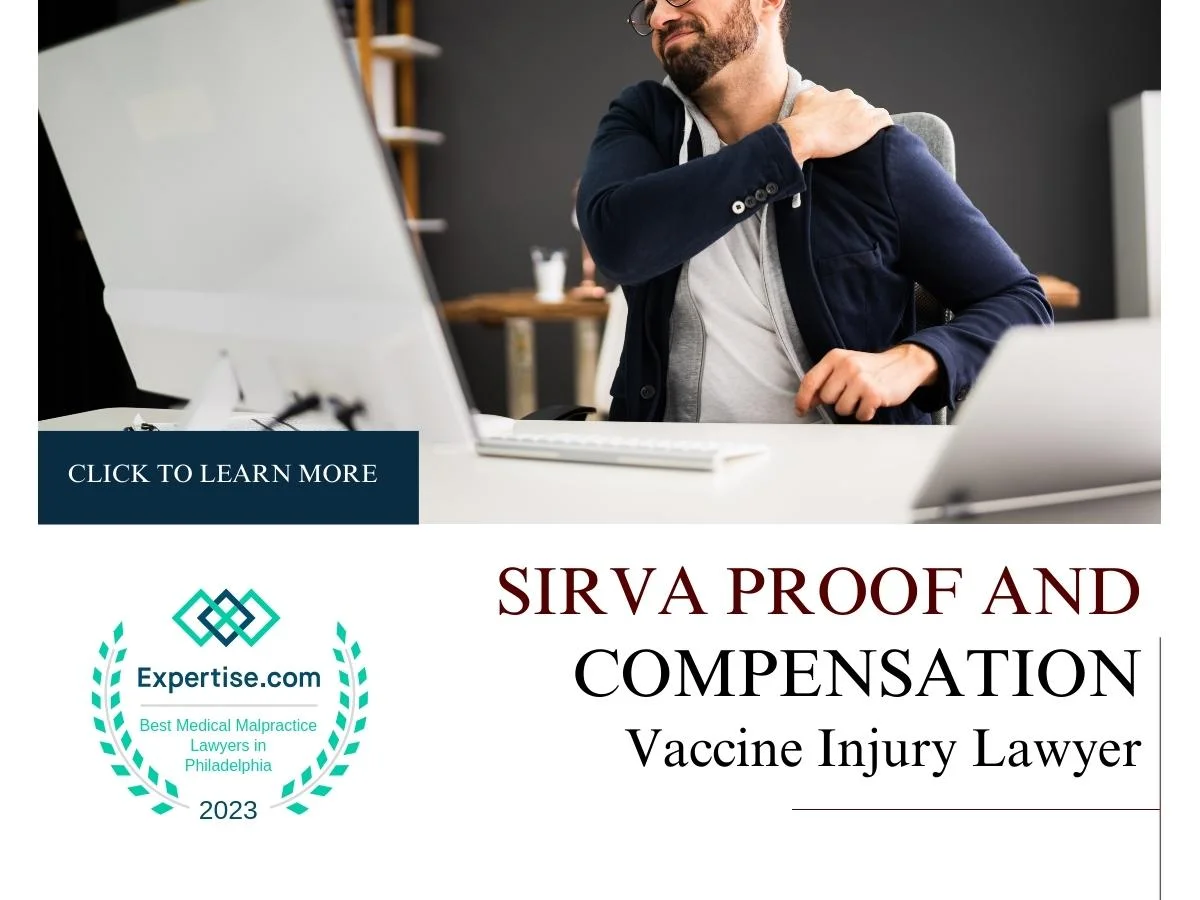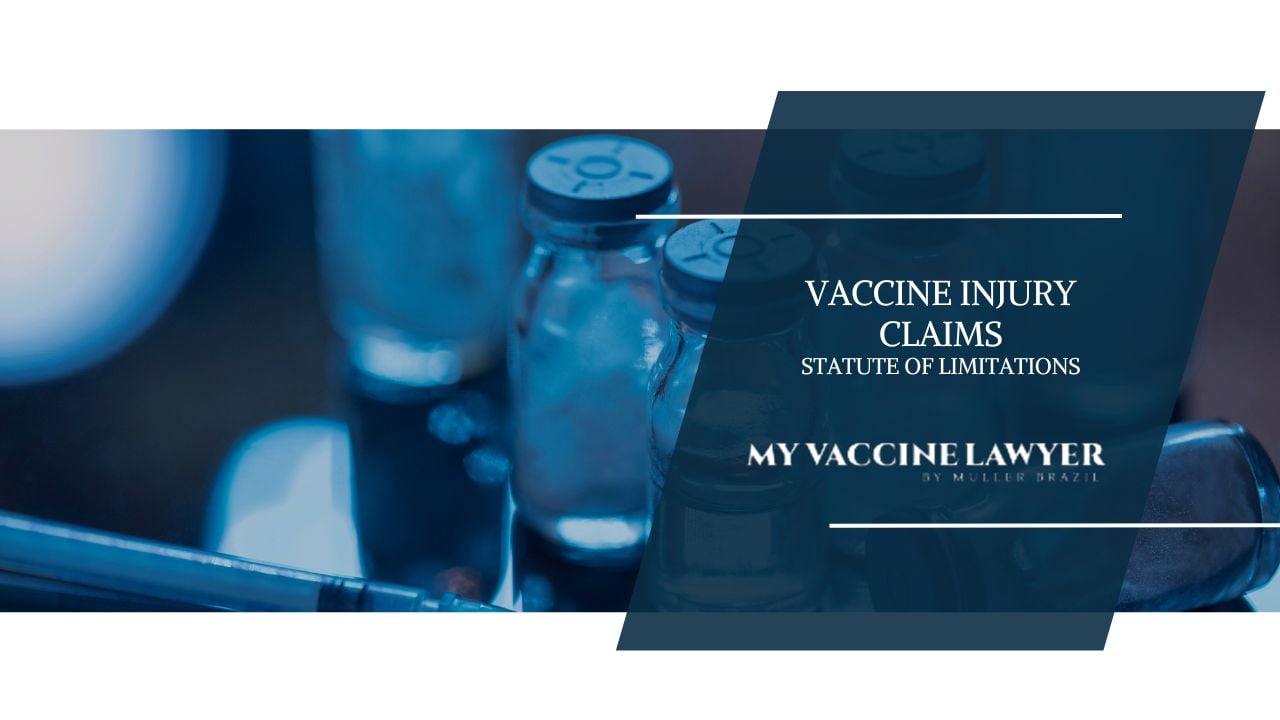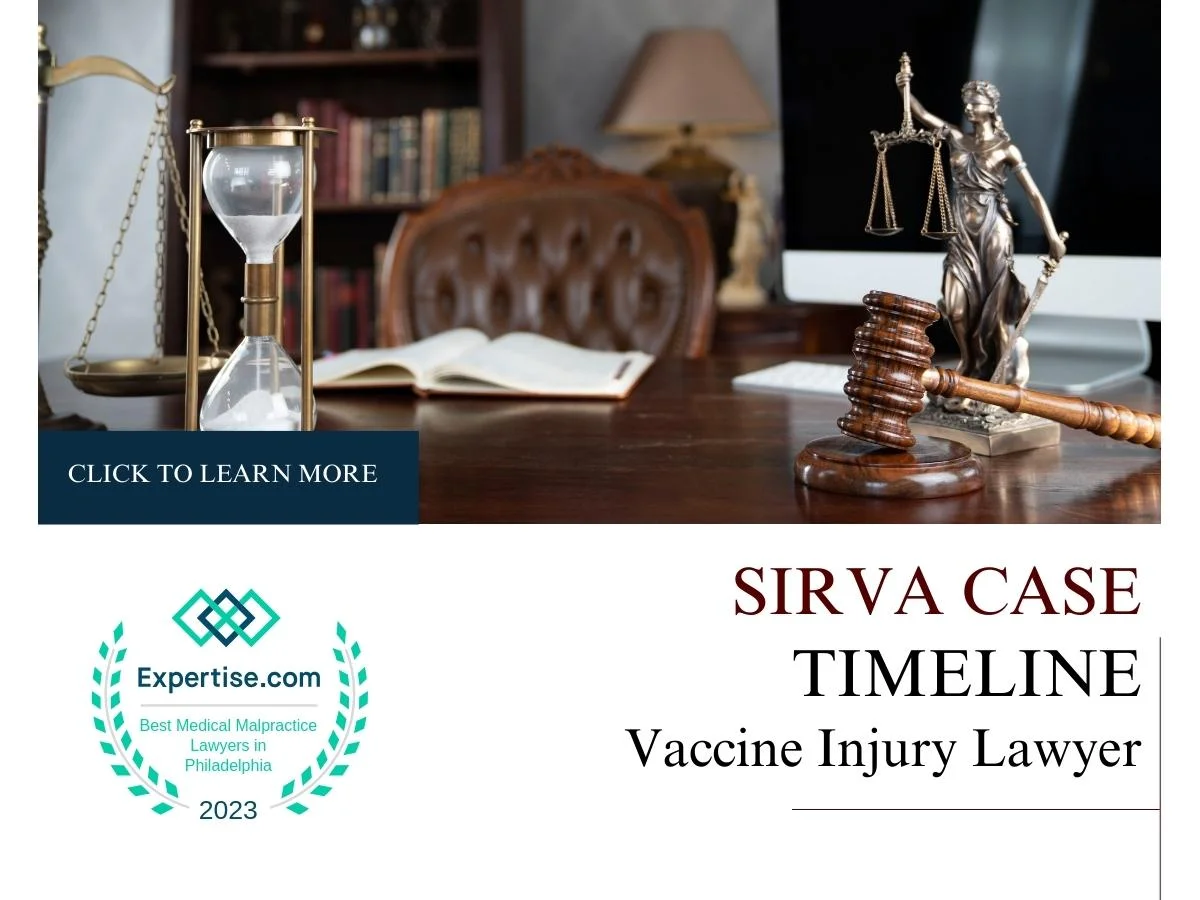How to Prove SIRVA and Get Compensation
If you have been diagnosed with a SIRVA (Shoulder Injury Related to Vaccine Administration) injury, you may wonder how to prove your injury and...
10 min read
Vaccine Injury Law Resources / SIRVA / How long do SIRVA cases take to settle?
 Paul Brazil
:
Apr 12, 2023 8:45:03 AM
Paul Brazil
:
Apr 12, 2023 8:45:03 AM
Shoulder injury from a vaccine (SIRVA), settling a case can take several months to years. Factors affecting the timeline include case complexity, evidence strength, and negotiation willingness. Working with an experienced attorney and using the National Vaccine Injury Compensation Program (VICP) can speed up the process and help you get fair compensation.
If you have been diagnosed with SIRVA, you may be entitled to compensation through a legal claim. However, one question that many people have is: how long will it take for a SIRVA case to be settled? Below we'll explore the factors that can impact the timeline of SIRVA case settlements, what you can expect during the process, and how to manage your expectations while pursuing compensation for your injury.
SIRVA, or Shoulder Injury Resulting from Vaccine Administration, is a condition that can occur after receiving a vaccine. While SIRVA is rare, it is important to understand which vaccines are most commonly associated with the condition. The flu vaccine is a vaccine that has been linked to SIRVA, particularly if the vaccine is administered too high on the shoulder. The tetanus, diphtheria, and pertussis (Tdap) vaccine has also been associated with SIRVA, as have other vaccines that are administered into the muscle of the upper arm. Additionally, some studies have suggested that certain factors, such as improper injection technique or the use of a needle that is too long, may increase the risk of SIRVA.
If you have experienced shoulder pain or an injury after receiving a vaccine, it is important to seek medical attention and speak with an experienced attorney who can help you understand your legal rights and options.
SIRVA is a condition that may happen after getting a vaccine and can result in shoulder injury. Although rare, it can be serious. While there is no foolproof way to avoid the risk of SIRVA completely, there are steps that you can take to reduce your risk. One of the most important things you can do is to ensure you receive your vaccine from a qualified healthcare professional trained in proper injection technique.
Additionally, it's important to communicate any concerns or questions you may have with your healthcare provider before receiving the vaccine. Consider asking your provider to use a smaller needle or to administer the vaccine lower on your arm, which may reduce the risk of injury. Finally, monitor your symptoms carefully after receiving a vaccine and seek medical attention promptly if you experience pain, weakness, or loss of mobility in your shoulder or arm. If you experience SIRVA, an experienced attorney can help you understand your legal rights and options for seeking compensation for your injury.
While it is possible to file a SIRVA claim without the help of an attorney, it is generally recommended that you seek legal representation. This is because SIRVA claims can be complex and challenging to navigate independently. An experienced attorney can increase your chances of obtaining fair compensation for your injury. An attorney can help you understand the legal process, assess the strength of your claim, gather and organize evidence, and negotiate with the vaccine manufacturer or other responsible parties on your behalf. Additionally, an attorney can ensure that your claim is filed within the statute of limitations and that all necessary documentation is properly submitted.
Overall, while you may be able to file a SIRVA claim on your own, the benefits of having an experienced SIRVA lawyer on your side can make a significant difference in the outcome of your case. It's important to speak with an attorney with experience handling SIRVA claims to determine the best course of action for your situation.
A vaccine injury legal claim is a type of legal action that seeks compensation for injuries or illnesses caused by a vaccine. The process for filing a vaccine injury claim differs from other types of personal injury claims. It is governed by the National Vaccine Injury Compensation Program (VICP).
Under the VICP, individuals who have suffered a vaccine injury can file a claim with the U.S. Court of Federal Claims. The first step in the process is to file a petition with the court, which includes documentation of the injury, proof of vaccination, and medical records. The VICP then reviews the petition to determine if the injury meets the legal criteria for compensation. The VICP determines that the injury is eligible for compensation. If the VICP denies the claim, the injured party may choose to file a lawsuit in civil court. In that case, the injured party may receive financial compensation for medical expenses, lost wages, and other related costs.
It's important to note that the VICP is not the only option for seeking compensation for a vaccine injury. Individuals may also choose to file a lawsuit directly against the vaccine manufacturer or other parties that may be responsible for the injury. However, this type of legal action can be more complex and challenging to navigate. It is generally recommended that you seek legal representation if considering this option.
The amount of compensation you may receive from a SIRVA case can vary widely depending on a number of factors, including the severity of your injury, the extent of your medical expenses, and the impact of your injury on your daily life and ability to work.
In general, compensation for a SIRVA injury may include reimbursement for medical expenses, lost wages or income, pain and suffering, and other related costs. The amount of compensation may also depend on whether you seek compensation through the National Vaccine Injury Compensation Program (VICP) or a civil lawsuit against the vaccine manufacturer or other responsible parties.
Under the VICP, compensation for a SIRVA injury is based on a predetermined schedule of payments, which varies depending on the severity of the injury and the duration of the symptoms. In 2021, the maximum compensation for a SIRVA injury was $250,000.
If you choose to file a civil lawsuit against the vaccine manufacturer or other parties responsible for your injury, the amount of compensation that you may be able to receive will depend on the specific circumstances of your case and may be influenced by factors such as the strength of your evidence, the liability of the defendant, and the ability to negotiate a settlement or obtain a favorable judgment in court.
The compensation you can receive from a SIRVA case can be significant. It's important to speak with an experienced attorney who can help you understand your legal rights and options for pursuing compensation for your injury.
The deadline for filing a SIRVA claim can vary depending on the circumstances of your case. If you are filing a claim through the National Vaccine Injury Compensation Program (VICP), you generally have three years from the date of the first symptom of the vaccine-related injury to file a claim. However, there are some exceptions to this deadline, such as if the vaccine caused a latent injury that was not immediately apparent or if the injured person was a minor at the time of the injury.
If you are filing a lawsuit against the vaccine manufacturer or other responsible parties outside of the VICP, the statute of limitations can vary depending on the state where the lawsuit is filed. In some states, the statute of limitations for filing a SIRVA claim may be as short as one year, while it may be longer in other states. It is important to consult with an experienced attorney to understand the specific deadlines and requirements for filing a SIRVA claim in your state.
Regardless of the deadline for filing a claim, it is important to act quickly to ensure that your rights are protected and that you have the best chance of receiving compensation for your injuries. Contacting an experienced SIRVA attorney as soon as possible after experiencing symptoms of a vaccine-related injury can help ensure you meet all necessary deadlines and receive the legal guidance and support you need to pursue a successful claim.
The time it takes to settle a SIRVA case can vary widely depending on several factors, including the case's complexity, the strength of the evidence, and the willingness of the vaccine manufacturer or other responsible parties to negotiate a settlement. SIRVA cases can generally take anywhere from several months to several years to settle. If you are pursuing compensation through the National Vaccine Injury Compensation Program (VICP), the process typically takes several months to a year or more, depending on the complexity of the case and the backlog of claims.
If you are pursuing a civil lawsuit against the vaccine manufacturer or other responsible parties, the length of time it takes to settle the case can depend on a number of factors, including the number of parties involved, the strength of the evidence, and the complexity of the legal issues involved. It is common for civil lawsuits to take several years to resolve. Overall, the length of time it takes to settle a SIRVA case can be unpredictable. It is important to be patient and work closely with an experienced attorney who can help guide you through the legal process and help you understand what to expect at each stage of the case.
While the settlement process for a SIRVA case can take time, there are a few steps you can take to speed up the process potentially:
Provide complete and accurate information: Make sure to provide your attorney with all relevant medical records, bills, and other documentation related to your injury. This can help avoid delays caused by incomplete or missing information.
Respond promptly: If your attorney or the defendant's attorney requests information or documentation from you, respond promptly and provide the requested information as soon as possible.
Consider mediation: Mediation can effectively resolve a SIRVA case more quickly than going to trial. Mediation involves a neutral third party who helps facilitate negotiations between the parties to reach a settlement agreement.
Work with an experienced attorney: An experienced SIRVA attorney can help you navigate the settlement process and potentially negotiate a fair settlement on your behalf. They can also help you identify potential roadblocks to a settlement and take steps to address them.
It's important to remember that while you may be eager to resolve your SIRVA case as quickly as possible, it is also important to prioritize achieving a fair settlement that adequately compensates you for your injuries. Working closely with an experienced attorney and being patient throughout the settlement process can help ensure your rights are protected and you have the best chance of achieving a successful outcome.
Resolving a SIRVA claim typically involves several stages, which may include the following:
Initial consultation: The first step in resolving a SIRVA claim is to speak with an experienced attorney who can evaluate your case and help you understand your legal rights and options.
Gathering evidence: Once you have decided to pursue a SIRVA claim, your attorney will gather evidence to support your case. This may include medical records, vaccine records, and other injury documentation.
Filing a claim: If you seek compensation through the National Vaccine Injury Compensation Program (VICP), your attorney will file a claim with the program on your behalf. If you are pursuing a civil lawsuit against the vaccine manufacturer or other responsible parties, your attorney will file a lawsuit in court.
Negotiating a settlement: In some cases, the vaccine manufacturer or other responsible parties may be willing to negotiate a settlement to avoid a lengthy court battle. Your attorney will work with you to negotiate a fair settlement compensating you for your injury.
Litigating the case: If a settlement cannot be reached, your case may proceed to trial. Your attorney will represent you in court and present evidence to support your claim.
Appeals: If the case is not resolved in your favor, you may have the option to appeal the decision to a higher court.
Resolving a SIRVA claim can be complex and time-consuming. It's important to work with an experienced attorney who can help guide you through each stage of the process and help you understand your legal options and the potential outcomes of your case.
The duration of SIRVA case settlements can be impacted by several factors, including:
The complexity of the case: Cases that involve more complex legal issues or a greater number of parties may take longer to settle than simpler cases.
Strength of the evidence: The strength of the evidence supporting your claim can impact how long it takes to settle your case. If your evidence is strong, the vaccine manufacturer or other responsible parties may be more likely to settle the case quickly rather than risk a court battle.
Willingness to negotiate: The vaccine manufacturer or other responsible parties may be more willing to negotiate a settlement if they believe it is in their best interest. The case may take longer to resolve if they are willing to negotiate or offer an adequate settlement amount.
Backlog of claims: If there is a backlog in the National Vaccine Injury Compensation Program (VICP), it may take longer to process your claim and reach a settlement.
Court schedule: If your case proceeds to trial, the court's schedule can impact how long it takes to resolve.
Appeals process: If the case is appealed, it can extend the duration of the settlement process.
Overall, the duration of a SIRVA case settlement can be unpredictable. Working closely with an experienced attorney can help you navigate the legal process and help you resolve your case more efficiently.
Managing expectations during a SIRVA case settlement can be challenging, as many factors can impact the duration and outcome of your case. Here are a few tips for managing your expectations during the settlement process:
Stay informed: Keep in regular communication with your attorney and stay up-to-date on the status of your case. Your attorney can help you understand the potential timelines involved in your case and provide guidance on what to expect.
Be patient: Settlement negotiations can take time, so it is important to be patient and stay focused on the long-term goal of achieving a fair settlement. Rushing the process and or becoming overly anxious can potentially harm the outcome of your case.
Be realistic: While it is important to pursue a fair settlement, it is also important to be realistic about what can be achieved. Your attorney can help you understand the strengths and weaknesses of your case and provide guidance on a reasonable settlement amount.
Understand the process: Understanding the settlement process can help you manage your expectations and feel more in control of the situation. Ask your attorney to explain your case's legal process and potential outcomes.
Take care of yourself: Dealing with a SIRVA case can be stressful and emotional, so taking care of yourself during the settlement process is important. Practice self-care activities such as exercise, relaxation techniques, and spending time with loved ones.
Managing expectations during a SIRVA case settlement requires patience, realistic expectations, and a clear understanding of the legal process. Working closely with an experienced attorney can help you navigate the settlement process and achieve a fair outcome for your case.
SIRVA cases can take time to settle due to various factors, such as the case's complexity, negotiations between the parties, and the court's schedule. It is important to manage your expectations and work closely with an experienced attorney who can guide you through the process and advocate on your behalf.
You can speed up the settlement process by providing complete and accurate information, being responsive to requests, and being open to settlement negotiations. However, it is important to prioritize achieving a fair settlement that adequately compensates you for your injuries.
If you believe you have a SIRVA case, contact one of our experienced vaccine injury lawyers, who can provide you with the guidance and representation you need to protect your legal rights.
Paul Brazil is a native of Dunmore, Pennsylvania and a graduate of Dunmore High School. For his undergraduate education, he attended Bloomsburg University where he majored in political science. He then went on to earn his JD from Widener University School of Law. Following graduation from law school, Mr. Brazil worked at a large Philadelphia civil defense firm where he litigated workers’ compensation claims and Heart and Lung Act cases. In 2012, he joined with his coworker Max Muller to form Muller Brazil.

If you have been diagnosed with a SIRVA (Shoulder Injury Related to Vaccine Administration) injury, you may wonder how to prove your injury and...

If you experience shoulder pain after a vaccination, you might have a Shoulder Injury Related to Vaccine Administration (SIRVA). Exercises like the...

In the United States, if you experience a vaccine injury, you have three years from the day the injury symptoms first show up to file a claim under...
